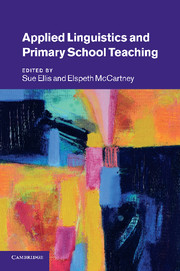Book contents
- Frontmatter
- Contents
- List of figures
- List of tables
- Notes on contributors
- Preface
- Editors' notes and conventions
- Introduction
- Part I Policy and diversity in the twenty-first-century primary school
- Introduction to Part I
- 1 The control of language or the language of control? Primary teachers' knowledge in the context of policy
- 2 Working with children who speak English as an additional language: an Australian perspective on what primary teachers need to know
- 3 Preparing for diversity: the alternatives to ‘linguistic coursework’ for student teachers in the USA
- 4 Supporting children with speech, language and communication needs
- 5 Foreign language teaching in the primary school: meeting the demands
- Part II The range and focus of applied linguistics research
- Part III Empowering teachers and teachers' use of knowledge
- References
- Index
4 - Supporting children with speech, language and communication needs
Published online by Cambridge University Press: 26 April 2011
- Frontmatter
- Contents
- List of figures
- List of tables
- Notes on contributors
- Preface
- Editors' notes and conventions
- Introduction
- Part I Policy and diversity in the twenty-first-century primary school
- Introduction to Part I
- 1 The control of language or the language of control? Primary teachers' knowledge in the context of policy
- 2 Working with children who speak English as an additional language: an Australian perspective on what primary teachers need to know
- 3 Preparing for diversity: the alternatives to ‘linguistic coursework’ for student teachers in the USA
- 4 Supporting children with speech, language and communication needs
- 5 Foreign language teaching in the primary school: meeting the demands
- Part II The range and focus of applied linguistics research
- Part III Empowering teachers and teachers' use of knowledge
- References
- Index
Summary
Introduction
One aspect of applied linguistics is clinical linguistics, defined as ‘the study of the numerous ways in which the unique human capacity for language can be disordered’ (Cummings 2008: 2).
Whilst clinical linguistics might be considered to be the domain of the speech and language therapist, children with speech language and communication needs (SLCN) are present in every classroom, and, therefore, one can argue the case for teachers to have sufficient linguistic knowledge to support these pupils. This chapter is primarily about spoken language. However, mention will be made of children with dyslexia, as similar issues pertain to this group. It will describe the range of speech, language and communication difficulties experienced by children in schools, addressing policy and practice issues. Different aspects of language will be considered to identify what knowledge might be useful for teachers and how it might be applied. Issues in teaching children from a minority language background who are learning through their second language are not addressed here, but are covered in the chapter by Letts (this volume). The UK educational context will be used to illustrate the key issues.
What are speech language and communication needs?
There are a number of ways in which SLCN can be defined. A clear description has been provided by Marshall, Ralph and Palmer (2002).
Information
- Type
- Chapter
- Information
- Applied Linguistics and Primary School Teaching , pp. 53 - 63Publisher: Cambridge University PressPrint publication year: 2011
Accessibility standard: Unknown
Why this information is here
This section outlines the accessibility features of this content - including support for screen readers, full keyboard navigation and high-contrast display options. This may not be relevant for you.Accessibility Information
- 2
- Cited by
